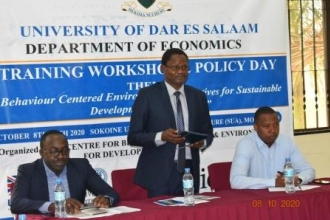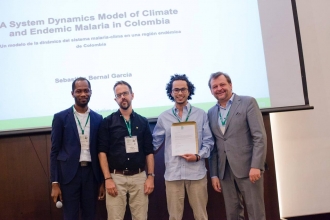
“Women’s work-life is not a women’s issue”
She is dividing her time between the Indian Statistical Institute in Delhi, the International Growth Centre’s India program, and the Institute of Labour Economics in Bonn. Currently, she is leading…

She is dividing her time between the Indian Statistical Institute in Delhi, the International Growth Centre’s India program, and the Institute of Labour Economics in Bonn. Currently, she is leading…

EfD researcher Fredrik Carlsson is interviewed on the topic "Mapping the path of plastics to reduce ocean emissions". The article, which is published on the University of Gothenburg's website, gives…
Reference number: PAR 2020/1154
Data Coordinator
The University of Gothenburg tackles society’s challenges with diverse knowledge. 49 000 students and 6 400 employees make the university a large and inspiring place to work and study. Strong research and attractive study programmes attract scientists and students from around the world. With new knowledge and new perspectives, the University contributes to a better future.

Environment for Development (EfD) Tanzania together with the Centre for Behavioral Studies (CBS) held a two-day (8th-9th September 2020) workshop for the purpose of policy interaction and training…
The Environmental Economics and Natural Resource Group (ENR) at Wageningen University and Research (WUR) is looking for a Assistant Professor to join their team. The applicants must have completed a PhD in economics with a focus, or at least a strong interest on environmental issues. We have a preference for strong quantitative empirical skills (e.g.

EfD’s Annual Meeting is approaching and the award jury is busy evaluating all the qualified nominees for Gunnar Köhlin’s Best Master Thesis Award. In the meantime, let’s meet last year’s winner…
Vision |
|
The main objective of this program is to contribute to increased knowledge regarding the development of sustainable capture fisheries, aquaculture, and marine spatial planning, and their links to blue growth, food security, and poverty alleviation. |
Areas of Contribution |
|
The Marine program has methodologies and applications regarding |
Purpose – Climate change has become one of the most important development challenges worldwide. It affects various sectors, with agriculture the most vulnerable. In Ethiopia, climate change impacts are exacerbated due to the economy’s heavy dependence on agriculture. The Ethiopian Government has started to implement its climate-resilient green economy (CRGE) strategy and reduce CO2 emissions. Therefore, the purpose of this study is to examine the impact of CO2 emission on agricultural productivity and household welfare.